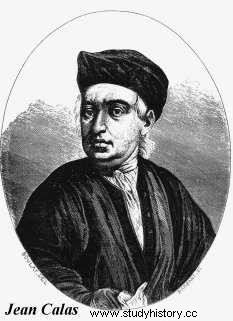Born in the Tarn, and established as a fabric merchant in Toulouse, Jean Calas and his family are of the Protestant faith.
In October 1791, Jean Calas finds his son hanged in his shop. To avoid family dishonour, he initially conceals Marc-Antoine's suicide. The trial takes place against a background of religious discord:the parliament of Toulouse, a strongly Catholic city, accuses Jean Calas of having killed his son in order to avoid his conversion to Catholicism, a rumor spread by the neighbors of the family. Despite the testimony of the parish priest which invalidated Marc-Antoine's desire to get closer to the Catholic religion, Jean Calas was condemned to the torture of the wheel, strangled and burned in the public square on March 10, 1762.
The philosopher Voltaire took up the Calas Affair and published his Treatise on Tolerance in 1763 . Convinced of the innocence of Jean Calas after an investigation carried out at the family and the lawyer of the executed, he thinks that the intolerance, inherited from the Reform and the wars of Religion, explains the witchcraft trial that suffered the Calas family.
Thus, the actions of Voltaire (he invokes, for example, the King's Council) lead the case to be retried, and Jean Calas is rehabilitated on March 9, 1765, thus closing this miscarriage of justice.
1698 - 1762

Status
Trader
Cloth Merchant
